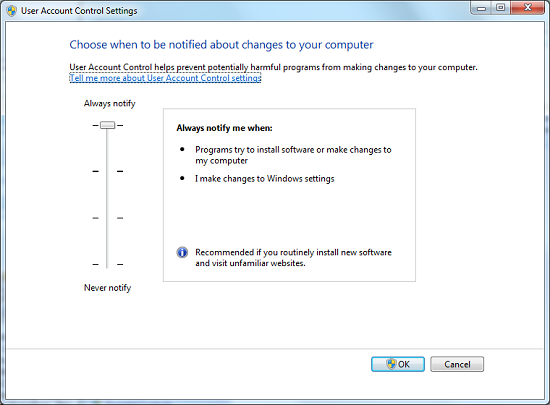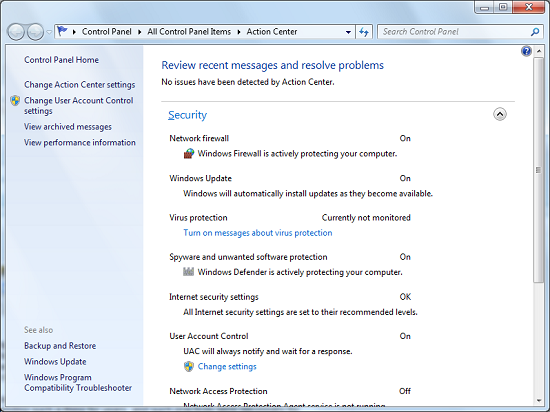Windows 7: Release Candidate 1 Preview
by Ryan Smith and Gary Key on May 5, 2009 11:00 PM EST- Posted in
- Systems
Reworking UAC
Predictably, one of the most common complaints about Vista was the User Access Control (UAC) feature, which firmly established a real degree of security in Vista by blocking applications from attaining administrator-level privileges by default. It was something that was long overdue for Windows given how easy it is to compromise a machine when everything runs with admin privileges, but that doesn’t mean it was taken well.
Half of the problem going into Vista’s release was that few applications were coded following best security practices, even though Microsoft had been recommending such a thing for years, and such practices were necessary for applications to work correctly under limited user accounts. With so many poorly coded applications misbehaving under Vista until they were brought up to spec by their developers, it left a bad taste in the mouths of many. Compounding the problem was that Vista’s UAC implementation was not streamlined very well, resulting in redundant notices. Microsoft resolved some of the streamlining issues in Vista SP1, but this never completely satisfied users who were expecting a more XP-like (and insecure) experience.
With Windows 7 we have an attempt at a compromise, which is a noble intention by Microsoft, but leaves us concerned about the security implications. Previously UAC could only be turned on or off (Group Policy settings not withstanding), which would sometimes result in unhappy users shutting it off and giving up most of Vista’s security abilities in the process. With Windows 7, UAC has now been divided up into four levels: Off, followed by three levels of increasingly strong security. Level 3 is the equivalent of Vista’s UAC mode, meanwhile Level 2 is the default setting for Windows 7. With Level 2, certain signed Microsoft applications (basically most of the Control Panel apps) are allowed to elevate to administrator privileges without needing user confirmation. The working belief here is that most people are encountering most of their UAC prompts when initially configuring Windows, and if they didn’t encounter those early prompts they would have no great reason to turn UAC off entirely, particularly since 3rd party applications are so much better behaved these days.

The UAC Control Panel With Level Slider
Hence the compromise is that UAC prompts are disabled, but only for the Control Panel apps, meanwhile all other regular apps are still controlled by UAC as normal. The concern we have with this compromise is that with applications allowed to auto-elevate from user to administrator, it creates a potential local privilege escalation exploit. For Beta 1, a proof of concept exploit was put together that used rundll32 to disable UAC entirely without informing the user or requiring their intervention. In return Microsoft removed the UAC control panel from the auto-elevating list so that any direct attempts to manipulate it still require user intervention. This blocked the proof of concept exploit while maintaining all the other benefits of Level 2 UAC. It should be noted however that similar exploits could still work with Level 1, as it’s Level 2 without the secure desktop screen (thereby allowing apps to fake pressing the Allow button).
At this point it remains to be seen if Level 2 could be exploited in a similar manner, such as by breaking out of another auto-elevated application and attacking UAC from there. The fact that it leaves an obvious potential attack vector open leaves us leery of Level 2. Microsoft had the security situation right in the first place with Level 3/Vista, and it may have been better if it stayed that way.
With that said, Level 2 does what it’s advertised to do. Compared to Level 3/Vista, you’re going to get far fewer UAC prompts when messing with Windows’ settings. Undoubtedly it won’t satisfy those who absolutely abhor UAC, but at some point Microsoft has done everything they can.
Quickly, the other security element that was reworked for Windows 7 is the Security Center, which has been expanded and renamed the Action Center. Besides being a one-stop-shop for various Windows security features, now it is also home to an overview of system maintenance tasks and troubleshooting help. This doesn’t significantly change the functionality of the Action Center, and the biggest change that most people will notice is the GUI.

The Windows 7 Action Center










121 Comments
View All Comments
Adul - Wednesday, May 6, 2009 - link
MS cash reserves are actually around $26.3 billionsnookie - Wednesday, May 6, 2009 - link
Apple's stock is dramatically higher and they have much more cash in reserve. Xbox sure in hell was designed to be profitable on both hardware and games and neither is. Microsoft knew they would lose money the 1st few years but nothing like this. It's been a total disaster for them financially.Investors are bullish on Microsoft? Well a lot of them aren't. Microsoft lost half its value in 2008. Half.
Q9 has not been dismal for Apple. Biggest 2nd quarter ever in the middle of a recession. i guess that must be because of their commercials though....new iPhone coming up in June which will sell as fast as they can make them and Microsoft can't even get that blind, crippled, and dumb Windows Mobile out the door. This is a company in dire need of new leadership and middle management. Instead their answer is to rant and rave and piecemeal out development to whichever country is cheaper this week? Sound like a long term formula to success to you?
chewietobbacca - Thursday, May 7, 2009 - link
You're kidding right? Apple's stock is higher but their market cap is worth $60 billion less because share prices don't mean sh!t. Apple has fewer shares out there hence each one is worth more, but MSFT is still worth 60billion more than AAPL, and if MSFT goes up to $24 a share again, it'll be worth even more.Patrick Wolf - Wednesday, May 6, 2009 - link
Psycho...Jjoshua2 - Wednesday, May 6, 2009 - link
That's good to see its performance is good in general, and its gaming is consistently higher as well. Posting from Windows 7 on my Wind Netbook FTW :)Any pricing news? I hope there's a great student rate.
griffhamlin - Wednesday, July 15, 2009 - link
"gaming perfs constistently higher" ???are you kidding ? the song remain the same ...
samspqr - Wednesday, May 6, 2009 - link
the main reason I hate vista is because it's not XP: everything looks different, I can never find what I'm looking for, so getting used to it would require an effort that doesn't seem to have any compensating advantages (I don't like fancy UIs -I still use the W2K look- and I don't really play games anymore)then, about windows7, I still feel it's just a re-spun new SP for vista, with a UI revision, and the only reason it's getting better reviews than the original vista is that some time has passed, so there are better drivers, and you're testing it on much more powerful hardware
now, that Wind comment makes me wonder...
may even I fall on this one?
we'll see
cyriene - Wednesday, May 6, 2009 - link
I never understood how XP users say they "can never find anything in Vista."I'm not Windows expert, but after using my new laptop with Vista for 3 hours I knew where over 95% of the things and setting are located. And mos tof them are in the same place as XP for that matter. Control panel is the same... Start menu slightly different, but similar enough to figure out in 5 seconds. Plus if there is something you're looking for, the Vista help search actually ...HELPED me find it! I was actually suprised how well the help works. Also, if that failed a quick Google search is all it takes.
I don't feel MS should make ever OS exactly the same with everything in the same place. It makes sense for some things to move, and it isn't hard to find them if you take 5 seconds to do that.
dmpk - Saturday, May 30, 2009 - link
I agree. I think it is easy to find stuff on Vista with a little bit of playing. The transition is same as that from Windows 98 to Windows XP...piroroadkill - Thursday, May 7, 2009 - link
I completely agree. If you can't find something in Vista and you're used to XP, it's either so unused that it was removed, or you're just not trying, at all.